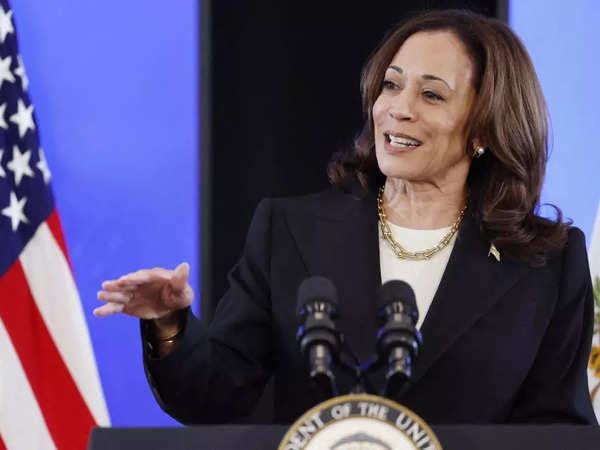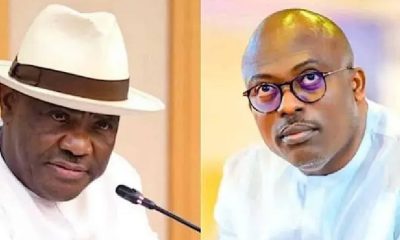Foreign
Suspense mounts as Macron prepares to name new France PM

French President Emmanuel Macron was expected Thursday to name a new prime minister a week after MPs toppled the government, with politicians across the spectrum holding their breath while he conducts a day visit to Poland.
Macron had promised to name a replacement government chief within 48 hours after meeting party leaders at his Elysee Palace office Tuesday, participants said.
But he remains confronted with the complex political equation that emerged from July’s snap parliamentary poll: how to secure a government against no-confidence votes in a lower house split three ways between a leftist alliance, centrists and conservatives, and the far-right National Rally (RN).
Greens leader Marine Tondelier urged Macron on Thursday to “get out of his comfort zone” as he casts around for a name.
“The French public want a bit of enthusiasm, momentum, fresh wind, something new,” she told France 2 television.
Former prime minister Michel Barnier, whose government had support only from Macron’s centrist camp and his own conservative political family, was felled last week in a confidence vote over his cost-cutting budget.
His caretaker administration on Wednesday reviewed a bill designed to keep the lights of government on without a formal financial plan for 2025, allowing tax collection and borrowing to continue.
Lawmakers are expected to widely support the draft law when it comes before parliament on Monday.
Sources close to the government said the announcement was expected when the president returns Thursday evening from his trip to Poland. But Macron has in the past often taken longer than expected with such decisions.
– ‘Look to the future’ –
At issue in the search for a new prime minister are both policies and personalities.
Mainstream parties invited by Macron on Tuesday, ranging from the conservative Republicans to Socialists, Greens and Communists on the left, disagree deeply.
One totemic issue is whether to maintain Macron’s widely loathed 2023 pensions reform, seen by centrists and the right as necessary to balance the budget but blasted by the left as unjust.
On the personality front, Macron’s rumoured top pick, veteran centrist Francois Bayrou, raises hackles on both the left — leery of continuing the president’s policies to date — and on the right, where he is personally disliked by influential former president Nicolas Sarkozy.
“It’s jammed” as Macron looks for a deal with Socialists and Greens to avoid a new no-confidence vote, a person close to him told AFP, adding that a pact could be “a vain hope”.
Another senior figure in Macron’s camp said informal talks with the two parties on Wednesday had not been conclusive.
Beyond Bayrou, prime ministerial contenders include former Socialist interior minister and prime minister Bernard Cazeneuve, serving Defence Minister and Macron loyalist Sebastien Lecornu, and former foreign minister Jean-Yves Le Drian.
But a name could still emerge from outside the pack, as happened with Barnier in September.
Those in circulation “are names that have been around for years and haven’t seduced the French. It’s the past. I want us to look to the future,” Greens boss Tondelier said.
– Far right ‘not unhappy’ –
While the suspense over Macron’s choice endures, the parties shut out from Tuesday’s talks are trying to paint those trying to find a way forward as weak.
The Socialists’ openness to cooperation has been denounced by their nominal ally Jean-Luc Melenchon, figurehead of the hard-left France Unbowed (LFI) — the other heavyweight force in the broad New Popular Front (NFP) left alliance.
“No coalition deals! No deal not to vote no confidence! Return to reason and come home!” Melenchon urged on Tuesday.
Hardline attitudes are not necessarily vote-winners, with just over two-thirds of respondents to an Elabe poll published Wednesday saying they want politicians to reach a deal not to overthrow a new government.
But confidence in the elite is limited, with around the same number saying they did not believe the political class could reach agreement.
In a separate poll from Ifop, RN figurehead Marine Le Pen was credited with 35 percent support in the first round of a future presidential election — well ahead of any likely opponent.
She has said she is “not unhappy” her far-right party has been left out of the horse-trading around government formation, appearing for now to benefit from the chaos rather than suffer blame for bringing last week’s no-confidence vote over the line.
AFP
Foreign
2 Dead, Many Injured As Plane Crashes In USA

A small plane has crashed into a backyard of a residential neighbourhood in southern California, killing two people onboard and damaging homes, local authorities said.
The Ventura County Fire Department said firefighters received reports Saturday afternoon of a single-engine aircraft that had crashed into two houses in Simi Valley, northwest of Los Angeles.
Police and the medical examiner’s office “verified there were two passengers in the aircraft, both of whom were fatally injured in the accident,” the county fire department wrote on X.
The two homes were occupied at the time of the crash, but no injuries to residents were reported, the fire department said.
Photo and video images posted by the department showed firefighters on top of a house with holes in the roof, a fence and brick wall between residences knocked down, and the tops of trees sheared off.
The Simi Valley Police Department said officers had located the plane “in the backyard of a residence.”
Police told CBS News that the pilot, a passenger, and a dog were aboard when the plane crashed at around 2:00 pm.
The Federal Aviation Administration said, according to CBS, that the plane was a Van’s RV-10, which had taken off from William J. Fox Airfield in Los Angeles County and was heading to Camarillo Airport in neighbouring Ventura County.
In January, a Van’s RV-10, a small plane with four seats, crashed into a commercial building near Fullerton Municipal Airport southeast of Los Angeles, killing at least two people and injuring 18 others.
AFP
Foreign
Kamala Harris blasts Trump’s “chaotic” presidency, privatisation push

A former U.S. Vice President Kamala Harris has launched a critique of Donald Trump’s administration, accusing the former president and his allies of executing a decades-old conservative plan to reshape America through fear, division, and unchecked power.
Speaking on Wednesday in San Francisco at an event organized by Emerge; a political group dedicated to training Democratic women for public office, Harris delivered her first major address since her party’s defeat in the November election.
“What we are, in fact, witnessing is a high velocity event, where a vessel is being used for the swift implementation of an agenda that has been decades in the making,” Harris told the audience.
She argued that the chaotic and aggressive start to Trump’s presidency is not random but rather a calculated effort to serve a narrow group of elites.
“An agenda to slash public education. An agenda to shrink government and then privatize its services. All while giving tax breaks to the wealthiest,” she said.
Harris accused Trump’s administration of fostering a dangerous political climate.
She said, “A narrow, self-serving vision of America where they punish truth-tellers, favor loyalists, cash in on their power, and leave everyone to fend for themselves.”
Since taking office, Trump’s presidency has been defined by a flurry of executive orders, touching on immigration, foreign aid, and even everyday regulations such as water pressure in showerheads.
While his supporters have welcomed the rapid changes, critics warn the administration is bypassing democratic norms and institutions.
Recent opinion polls reflect growing public unease with Trump’s policies, particularly his shifting stance on tariffs and international trade, which have caused economic uncertainty.
Harris, who has largely kept a low profile since leaving Washington in January, used the platform to warn about the administration’s efforts to intimidate opposition voices.
“President Trump, his administration, and their allies are counting on the notion that fear can be contagious. They are counting on the notion that, if they can make some people afraid, it will have a chilling effect on others,” she said.
But she also struck a hopeful tone, saying resistance is growing across the country.
“Fear isn’t the only thing that’s contagious. Courage is contagious. The courage of all these Americans inspires me,” Harris told the crowd.
Though she has yet to confirm any future political ambitions, Harris is widely believed to be considering a run for governor of California in 2026 or even a White House bid in 2028.
Her forceful speech suggests she may be preparing to return to frontline politics, and positioning herself as a leading voice in the fight against Trump-era conservatism.
Foreign
Trump offers Elon Musk continued role in administration

President Donald Trump on Wednesday, at the White House, offered to extend Elon Musk’s advisory role within his administration.
The 53-year-old tech billionaire attended the first Cabinet meeting since President Trump marked his first 100 days in office.
In what resembled a farewell message, Musk said the American people “voted for secure borders, safe cities, and sensible spending, and that’s what they’ve gotten.”
Musk observed that “a tremendous amount” had been accomplished in the first 100 days—more, he claimed, than any previous administration.
He stated that this achievement “portends very well for what will happen for the rest of the administration,” and opined that it could be the “greatest administration” in America’s history.
Musk, a senior presidential adviser who heads the Department of Government Efficiency, confirmed that $160 billion had been saved since January.
The Tesla CEO, however, expressed concern about the attacks on his company, adding: “They do like to burn my cars, which is not great.”
In response, President Trump thanked Musk for his contributions, noting that he has “sacrificed a lot” and has also been “treated unfairly.”
Trump added that the vast majority of people respect and appreciate Musk for opening “a lot of eyes to what could be done.”
“We just want to thank you very much, and you are invited to stay as long as you want,” the President added.
Musk reportedly no longer operates from the West Wing, but his DOGE team continues to work from the Eisenhower Executive Office Building within the White House complex.
-

 Entertainment24 hours ago
Entertainment24 hours agoHow I narrowly escaped death in U.S hotel room – Seun Kuti
-

 Opinion1 hour ago
Opinion1 hour agoRIVERS, WIKE, FUBARA, AND THE WAY FORWARD
-

 News21 hours ago
News21 hours agoReps Minority Caucus condemns unlawful detention of VDM, demands his immediate release
-

 News11 hours ago
News11 hours agoMinistry denies awarding N13bn contracts without due process
-

 News11 hours ago
News11 hours agoFULL STEPS: How to check 2025 JAMB results
-

 News23 hours ago
News23 hours agoWATCH Your family Lawyer’s last episode on how to end marriage
-

 News5 hours ago
News5 hours agoVDM may be released on Tuesday
-

 News11 hours ago
News11 hours agoCourt halts Abuja multi-million naira market project

















